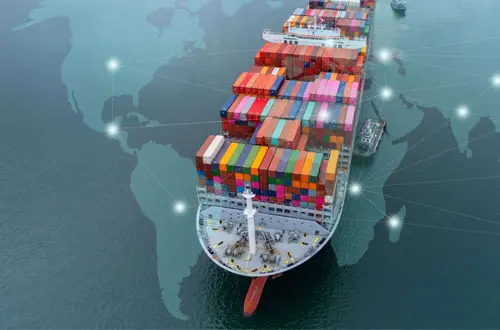Ways to Ensure Shipping Container Availability During Peak Seasons
During peak seasons, a shortage of shipping containers can prevent cargo from being shipped in a timely manner. Due to the insufficient number of containers, the loading and transportation speed of goods will be limited, thereby prolonging the transportation time of goods.
Second, a shortage of containers could lead to increased shipping costs. In order to meet the transportation needs of goods, logistics companies may resort to leasing or purchasing containers at high prices to solve the shortage problem. This results in higher transportation costs, which in turn affects costs throughout the supply chain.
Additionally, a shortage of containers may lead to an increased risk of damage and loss of cargo. Unable to load and transport goods in a timely manner, goods remain in ports or warehouses for extended periods of time, increasing the risk of damage and theft.
Exporters, especially those that rely heavily on the container shipping industry, may face challenges in providing containers for their products. This limitation may hinder their ability to meet international demand and take advantage of peak season opportunities. Because the goods cannot be delivered to the destination in time, the trade contract may not be performed on time, causing economic losses and reputation risks to exporters and importers.

A shortage of containers could disrupt entire supply chains, affecting the flow of raw materials, components and finished goods. Manufacturers may experience production delays, causing ripple effects throughout the supply network.
Businesses that are unable to fulfill orders on time due to container shortages may experience customer dissatisfaction. In the long term, this can damage customer relationships, brand reputation, and lead to potential loss of business.
Therefore, during the peak season, logistics companies and related departments need to predict and respond to container shortages in advance, and take effective measures to ensure timely transportation of goods, reduce transportation costs, reduce the risk of damage and loss of goods, and ensure the normal conduct of international trade. .
Ensuring the availability of shipping containers and minimizing delays in cargo transportation requires careful planning, effective communication and proactive management.
Plan ahead
Plan your shipments ahead of time and reserve containers as early as possible. Before transporting goods, communicate with your logistics service provider or freight forwarder to understand the supply and demand of containers. Book and schedule containers in advance to ensure they are available when needed. This helps secure the containers you need and allows shipping companies to allocate resources accordingly.
Real-time container tracking
Implement an advanced container tracking system to monitor the real-time location and status of containers in real time. This provides visibility into container movements, allowing you to proactively address any potential delays. Helps promptly identify and deal with any potential issues such as stranded or damaged containers.
Flexible scheduling and routing
ShopV prepares a variety of container transportation options to deal with unforeseen circumstances. Maintain flexibility in schedule and routes to adapt to changing conditions. This flexibility allows you to optimize shipping routes based on container availability and avoid potential bottlenecks.
Available for communication 24 hours a day
Maintain close communication with freight forwarders, logistics service providers and other relevant parties to stay informed and resolve any potential issues.
Insurance measures
Purchase transportation insurance for your shipment to cover potential delays, damage, or loss. This can provide you with some assurance and reduce financial losses due to container issues.
Optimize container return process
Streamline the container return process to minimize delays. Clear communication with shipping lines and efficient return procedures help speed container turnaround.
Monitor and resolve customs clearance issues
Proactively manage customs clearance processes to avoid delays. Make sure you have all necessary documentation accurately prepared in advance to facilitate smooth customs clearance.
By taking these steps, you can increase the availability of your shipping containers and reduce the risk of cargo shipment delays.
You are considering leasing a container to meet your long-term or frequent shipping needs. This allows for greater control over container availability and reduces reliance on spot market fluctuations. You can also choose a professional third-party freight forwarding service provider. ShopV has strong relationships with shipping companies and container providers. ShopV cooperates with multiple container suppliers and shipping companies to effectively reduce the risk of shortages for you. Having a diverse supplier network allows you to source containers from different sources based on availability. The long-term partnership could give ShopV priority access to containers and better coordinate shipping schedules.
With the above strategies, you can enhance your ability to ensure ocean container availability and minimize cargo transportation delays. Additionally, maintaining open communication with transportation partners and maintaining agility in logistics planning will help create a more resilient and efficient supply chain.
What are the transportation options for small shipping containers?
Small shipping containers can be transported by various means, including trucks, trains, and ships. Their standardized sizes make them compatible with different modes of transportation, providing flexibility for logistics.
How do I ensure the security of items stored in small shipping containers?
Small shipping containers are equipped with lockable doors, and additional security features can be added during customization. It's important to choose a secure location and use quality locks to protect the contents.
How can I access shipping container tracking information?
Container tracking information can be accessed through online tracking platforms provided by shipping companies, logistics providers, or third-party tracking services. Users typically need a container number or booking reference to retrieve relevant data.
Are there additional fees for cargo shipping container tracking services?
Container tracking services may be included as part of the overall shipping or logistics service, or they may incur additional fees. ShopV can provide free online tracking services.










